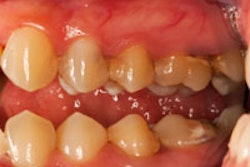
Research has demonstrated a connection between periodontal disease and coronary heart disease (CHD), but the nature of the relationship remains to be determined. To help under this association, researchers have developed a model to illustrate the possible links between periodontal disease and the pathogenesis, hallmarks, and biomarkers of CHD.
The researchers hope the model will further elucidate the potential effects of periodontal disease on coronary heart disease and why a significant risk for CHD has been observed in people with periodontal disease. Published in BMC Oral Health (November 15, 2016) by researchers in South Africa, the model provides a summary of the various possible pathways that could link periodontitis and CHD pathogenesis.
"It was shown that periodontal disease has significant physiological effects which are similar to or antagonize the pathogenesis of CHD," concluded Marc J. Mathews, PhD, and his colleagues at North-West University.
Dr. Mathews is a postdoctoral student in mechanical engineering at North-West University in South Africa.
Finding the overlap
While a correlation between periodontal disease and coronary heart disease is well-documented, and there is evidence that periodontal disease is associated with a higher risk of CHD, it remains unclear whether this correlation is due to a causal relationship or a shared underlying disorder, such as inflammation. The researchers sought to deepen understanding about this connection and determine the likely method of action for a possible causal relationship between them. This is important since 30% of the U.S. population has moderate periodontitis, the authors wrote.
The current study makes use of population-based data to gain more knowledge about CHD. The researchers started with an integrated model of CHD they had already developed that schematically illustrates the complexity of CHD and all theoretical pathogenetic pathways between various health factors and CHD.
The model included the following health factors:
“If a causal relationship between periodontal disease and CHD could be substantiated, it would elevate periodontal disease to an important CHD risk factor.”
- Alcohol
- Food
- Exercise
- Smoking
- Oral health
- Stress
- Depression
- Insomnia
- Sleep apnea
These health factors were all considered to be either lifestyle effects or comorbid health disorders associated with a statistically significant increase or decrease in CHD risk that were measurable through biomarkers and potentially influenced by medication, prevention, or other treatment.
The researchers created a diagram that illustrates the relationship among the pathogenesis of coronary heart disease, measurable biomarkers associated with significant increases or decreases in CHD risk, and how pathways between heart disease and periodontal disease are related to the CHD biomarkers. This model was developed through a systematic literature review for CHD pathogenesis, health factors, biomarkers, and pharmacotherapeutics.
To validate the theoretical pathways underlying heart disease that are potentially activated by periodontal disease, the researchers identified existing literature that has shown measured differences in serological biomarkers of CHD risk in periodontal disease patients.
The model shows that significant underlying pathogenetic links exist between periodontal disease and CHD that largely relate to increased inflammation and potential changes in hypercoagulability and insulin resistance.
It suggests CHD biomarkers that could be measured in periodontal disease patients to more adequately screen for CHD risk. These include the homeostatic model assessment (HOMA) insulin resistance marker, tumor necrosis factor-alpha, C-reactive protein, interleukin-6, growth differentiation factor-15, osteoprotegerin, myeloperoxidase, and fibrinogen.
Population testing needed
The authors noted that other factors, such as socioeconomic status, were not included but would have to be considered if future models are created for risk prediction.
Despite the understanding the model provides, more research is needed to conclude that there is a causal link between periodontal disease and heart disease, they wrote. They suggested studies on a population basis that might determine, for example, the relationship among periodontal disease, CHD, and serum biomarker levels.
"If a causal relationship between periodontal disease and CHD could be substantiated, it would elevate periodontal disease to an important CHD risk factor," the authors wrote.



















